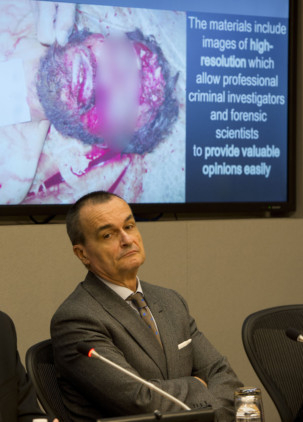
United Nations: France will table a proposal before the United Nations Security Council authorising the International Criminal Court to investigate crimes against humanity in Syria, French ambassador to the UN Gerard Araud said on Tuesday.
Araud told reporters that France hoped to introduce the resolution in the next few weeks, following a presentation to council members of a gruesome dossier containing thousands of photos showing detainees who had been starved or tortured in prisons run by the Syrian regime.
“We are going to try to obtain authorisation for the ICC to act,” Araud said. “We now have proof,” he added, referring to the dossier of evidence compiled by “Caesar,” the codename given to a defector who captured the images before fleeing Syria.
The “Caesar Report,” sponsored and funded by Qatar, a staunch supporter of opposition forces in Syria’s bloody civil war, states that 11,000 people died in regime jails between 2011 and 2013.
The report contains some 55,000 images depicting abuse of victims. Two of the experts who examined the photos and authenticated claims made by the defector say the dossier represents credible evidence to be put before the ICC. “Our judgement is that all this evidence is credible,” said David Crane, former chief prosecutor for the special tribunal on Sierra Leone that indicted Charles Taylor. “We were sceptical at first; as chief prosecutors, we rarely get direct and specific evidence of crimes against humanity.”
Crane also said the scale of atrocities was likely to be greater. “This is just the tip of the iceberg, it is a snapshot of three detention centres and there are 50,” he said.
British doctor Stuart Hamilton meanwhile displayed photos to the press he said showed prisoners who had suffered “a very severe degree of wasting resulting from weeks and months of starvation.”
Araud said he hoped the ICC would investigate all sides in the Syrian conflict for crimes committed during the war.
UN human rights chief Navi Pillay has condemned the “routine” use of torture in Syrian detention facilities. She also denounced the practice by armed groups in Syria.
Eleven of the 15 countries represented on the Security Council are members of the ICC and several have already backed action on Syria. The United States is not signed up to the ICC but supports the work of the court. The US envoy at the UN, ambassador Samantha Power, said the perpetrators of the crimes laid out in the dossier should face justice. “The gruesome images of corpses bearing marks of starvation, strangulation and beatings and today’s chilling briefing indicate... systematic, widespread and industrial killing,” Power said in a statement. “Nobody who sees these images will ever be the same. The perpetrators of these monstrous crimes must be held accountable, and the international community must unite in the face of such horrors.
“We owe it to the Syrian people — including to ‘Caesar,’ who has risked everything to bring these images to light — to ensure that the perpetrators of crimes against humanity are brought to justice.”
Any resolution tabled by France is almost certain to be vetoed by Syria’s ally Russia as well as China. Western diplomats, however, say even in the event of a Russian veto, the measure would continue to pile pressure on Damascus while accentuating Russia’s isolation on the council.
Araud said the presentation of the grisly “Caesar” dossier to council members, including Russia’s representative, had been “followed by several minutes of silence”.












